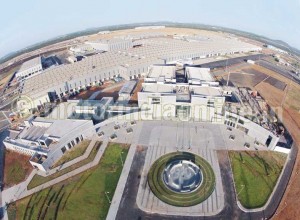Exclusive interview with Mr. S. Raj, IGCC Regional Director

The Indo-German Chamber of Commerce (IGCC) provides business solutions to companies which are interested in setting up a business connection with India or Germany. It is the largest bi-national German foreign chamber of commerce as well as the largest chamber in India. Indo-German trade relations have been characterised by years of collaboration between the two countries.
In 2006 IGCC celebrated its 50th year of trade and commerce relations. India also partnered with the Germans in the 2006 Hannover Fair, which is recognised as the world’s largest technology fair. IGCC is confident that the bilateral trade target of 20 billion Euros by 2015, set by the German Chancellor, Dr. Angela Markel, and the Indian Prime Minister, Dr. Manmohan Singh, is achievable.
In an exclusive interview to MOTORINDIA, Mr. S. Raj, Regional Director, IGCC, Chennai, speaks about the relationship between the two countries, post-liberalisation. He says: “Since liberalisation Germany has been the eighth most important country for investments in India. In 2011-12 it moved to the fifth position with an investment of $1.6 billion which is 117 per cent more than that of the previous year.
Foreign direct investment
According to Mr. Raj, the total foreign direct investment (FDI) from Germany since August 1991 amounts to $5.3 billion, which is 2.9 per cent of the total FDI in India. The top five sectors of German investments in India are services (19 per cent), chemicals, other than fertilizers, (14 per cent), trading (eight per cent), electrical equipments (eight per cent) and automobiles (seven per cent).
He says since liberalisation, 1,620 financial collaborations have been approved for Germany, which is 7.8 per cent of the total 20,649 for all countries. A total of 1,117 technical collaborations have been approved, which is 13.7 per cent of the total 8,115 approvals all over the world.
The top five sectors which are in need of technical transfer from Germany are industrial machineries (209), electrical equipments (168), chemicals (127), miscellaneous & mechanical (102) and transport industry (94). In the last 10 years about 800 new German companies, mostly SMEs, have invested in India.

Home for the auto industry
Highlighting the phenomenal growth in the automobile industry in Tamil Nadu, Mr. Raj observes: “Tamil Nadu is considered to be the home for the auto industry in India. The State has a strong manufacturing base developed over the last 50 years. The first two-wheeler, passenger car, commercial vehicle or the tractor came out from the State.
Out of the 1,500 German companies in India, 190 are in Tamil Nadu, Andhra Pradesh and in Pondicherry, of which 150 companies are in Tamil Nadu alone. The State accounts for one-third of the total turnover of the automotive industry and 25 per cent exports from the engineering sector in the country. Tamil Nadu has some of the largest MNCs like BMW, Daimler, Ford, Michelin, Bosch, Renault, Nissan, BASF and Siemens, and its own home-grown groups like TVS, Ashok Leyland, Rane and Amalgamations, to name a few. Also, several other companies from Germany are planning to set up a marketing or manufacturing facility in Tamil Nadu.”
Bilateral trade
According to a recent study conducted by the Hamberg University of Technology, the number of subsidiaries of Indian firms has gone up from 195 to 204 in May 2012. Germany continues to enjoy a key position in the international strategy of many Indian firms. The flow of outward foreign direct investment by Indian companies continues to remain stable despite the economic situation in the country. According to RBI, as per an official data, $10 billion have been invested in overseas ventures in 2011-12, and India’s overseas FDI assets have grown to $114 billion from $104 billion. The top five sectors of Indian investments in Germany are IT (73 firms accounting for 35 per cent), automobile (41 firms accounting to 20 per cent), consultancy firms (9 per cent), and pharmaceuticals and wind energy (7 per cent each).
The bilateral trade between India and Germany registered a staggering growth of around 19 per cent in 2011, to reach figures of 18.4 billion Euro, up from Euro 15.5 billion in 2010. However, considering the overall economic slow-down globally, the bilateral trade between the countries is estimated to have witnessed a slight decline of 4.2% at Euro 17.6 billion.
IGTC
The Indo-German Training Centre (IGTC) is the management training division of IGCC. Established in Mumbai in 1991, Chennai in 2005, Bangalore in 2008, and in Kolkata in 2010, all the four IGTCs share a common vision under the aegis of the Chamber. They conduct a flagship 18-month, full-time Post-Graduate Programme in Business Administration (PGPBA) based on the famed German Dual Education System that grooms business management trainees for the future requirements of the IGCC member-companies.
Against this backdrop, IGTC and Würth GmbH have entered into a collaboration for management training. The first batch of the professional management training programme of the Indo-German Training Centre, Chennai, exclusively designed for the Würth Group of Germany, was kicked off on August 2, with 15 students.